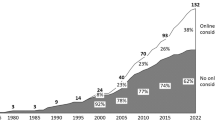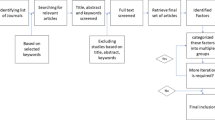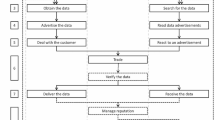Abstract
An auction house runs a second-price auction with a possibility of resale through re-auctions. It collects listing and closing fees from the seller. We find the fees which maximize the revenue of the auction house. In particular, we show that the optimal listing fee is zero. Our findings are consistent with the policies of eBay, Amazon, Yahoo, and other Internet auctions.
Similar content being viewed by others
References
Armstrong M (2006) Competition in two-sided markets. RAND J Econ 37: 668–691
Bikhchandani S, Huang C (1989) Auctions with resale markets: an exploratory model of treasury bill markets. Rev Financial Stud 2: 311–339
Calzolari G, Pavan A (2003) Monopoly with resale. Working paper 2003.20, Fondazione Eni Enrico Mattei
Garratt R, Tröger T (2006) Speculation in standard auctions with resale. Econometrica 74: 753–769
Gupta M, Lebrun B (1999) First price auctions with resale. Econ Lett 64: 181–185
Hagiu A (2004) Optimal pricing and commitment in two-sided markets. Working paper, Department of Economics, Princeton
Haile PA (1999) Auctions with resale. Working paper 33, Social Sciences, Wisconsin Madison
Haile PA (2000) Partial pooling at the reserve price in auctions with resale opportunities. Games Econ Behav 33: 231–248
Haile PA (2003) Auctions with private uncertainty and resale opportunities. J Econ Theory 108: 72–110
Horstmann IJ, LaCasse C (1997) Secret reserve prices in a bidding model with a resale option. Am Econ Rev 87: 663–684
Krishna V (2002) Auction theory. Academic Press, New York
McAfee RP, Vincent D (1997) Sequentially optimal auctions. Games Econ Behav 18: 246–276
Milgrom P (1987) Auction theory. In: Bewley T (eds) Advances in economic theory: fifth world congress. Cambridge University Press, Cambridge, pp 1–32
Myerson R (1981) Optimal auction design. Math Oper Res 6: 58–73
Myerson R, Satterthwaite M (1983) Efficient mechanisms for bilateral trading. J Econ Theory 29: 265–281
Reisinger M (2004) Two-Sided Markets with Negative Externalities. Department of Economics, University of Munich, discussion paper 2004-27
Rochet J, Tirole J (2003) Platform competition in two-sided markets. J Euro Econ Assoc 1: 990–1029
Wilson R (1985) Incentive efficiency of double auctions. Econometrica 53: 1101–1115
Zheng C (2002) Optimal auction with resale. Econometrica 70: 2197–2224
Author information
Authors and Affiliations
Corresponding author
Rights and permissions
About this article
Cite this article
Matros, A., Zapechelnyuk, A. Optimal fees in internet auctions. Rev Econ Design 12, 155–163 (2008). https://doi.org/10.1007/s10058-008-0044-9
Received:
Accepted:
Published:
Issue Date:
DOI: https://doi.org/10.1007/s10058-008-0044-9




